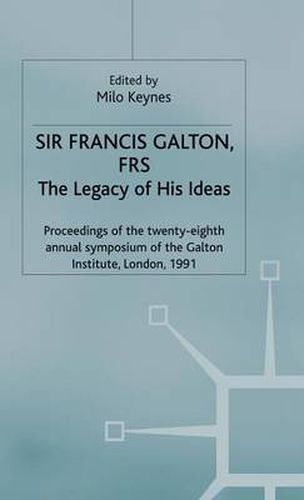Readings Newsletter
Become a Readings Member to make your shopping experience even easier.
Sign in or sign up for free!
You’re not far away from qualifying for FREE standard shipping within Australia
You’ve qualified for FREE standard shipping within Australia
The cart is loading…






This title is printed to order. This book may have been self-published. If so, we cannot guarantee the quality of the content. In the main most books will have gone through the editing process however some may not. We therefore suggest that you be aware of this before ordering this book. If in doubt check either the author or publisher’s details as we are unable to accept any returns unless they are faulty. Please contact us if you have any questions.
Part of the Studies in Biology, Economy and Society series, this book looks at Sir Francis Galton (1822-1911), a grandson of Erasmus Darwin. In his twenties he won fame as an explorer, writing The Art of Travel , and was on the council of the Geographical Society for many years. He worked at the prediction of weather, and described his discovery of the anticyclone to the Royal Society in 1862 and in Meteorographica (1863). He first became an anthropologist in 1862 when he joined the Ethnological Society, which emerged to become the Anthropological Institute in 1871 - Galton was president from 1885 to 1889. He initiated anthropometry and the measurement of human variation, and the use of photography for the analysis of differences, or individual characteristics, in a group. He recognized the uniqueness of Finger Prints (1893), and, in 1875, first used the records of pairs of identical twins in his research into the laws of heredity. It was on the publication of the Origin of the Species by his cousin Charles that he realized the importance of inheritance and the transmission of characters of body and brain from parent to child. His Hereditary Genius came out in 1869, Inquiries into Human Faculty in 1883, and Natural Inheritance in 1889. Besides his pre-Mendelian contributions to human genetics, Galton devised the correlation co-efficient, the higher mathematics of which was to be developed by Karl Pearson, and was thus concerned with the advancement of statistics. In 1883, he coined the word eugenics by which he meant good in birth and noble in heredity , and, in 1904, he founded the Galton Laboratory (now Department of Genetics and Biometry) at University College, London. He was the first president of the Eugenics Education Society in 1907, which became the Eugenics Society in 1926 and the Galton Institute in 1989. At the end of the book is a list of the presidents of the Eugenics Education Society 1908-1926, Eugenics Society 1926-1989, Galton Institute 1989-.
$9.00 standard shipping within Australia
FREE standard shipping within Australia for orders over $100.00
Express & International shipping calculated at checkout
This title is printed to order. This book may have been self-published. If so, we cannot guarantee the quality of the content. In the main most books will have gone through the editing process however some may not. We therefore suggest that you be aware of this before ordering this book. If in doubt check either the author or publisher’s details as we are unable to accept any returns unless they are faulty. Please contact us if you have any questions.
Part of the Studies in Biology, Economy and Society series, this book looks at Sir Francis Galton (1822-1911), a grandson of Erasmus Darwin. In his twenties he won fame as an explorer, writing The Art of Travel , and was on the council of the Geographical Society for many years. He worked at the prediction of weather, and described his discovery of the anticyclone to the Royal Society in 1862 and in Meteorographica (1863). He first became an anthropologist in 1862 when he joined the Ethnological Society, which emerged to become the Anthropological Institute in 1871 - Galton was president from 1885 to 1889. He initiated anthropometry and the measurement of human variation, and the use of photography for the analysis of differences, or individual characteristics, in a group. He recognized the uniqueness of Finger Prints (1893), and, in 1875, first used the records of pairs of identical twins in his research into the laws of heredity. It was on the publication of the Origin of the Species by his cousin Charles that he realized the importance of inheritance and the transmission of characters of body and brain from parent to child. His Hereditary Genius came out in 1869, Inquiries into Human Faculty in 1883, and Natural Inheritance in 1889. Besides his pre-Mendelian contributions to human genetics, Galton devised the correlation co-efficient, the higher mathematics of which was to be developed by Karl Pearson, and was thus concerned with the advancement of statistics. In 1883, he coined the word eugenics by which he meant good in birth and noble in heredity , and, in 1904, he founded the Galton Laboratory (now Department of Genetics and Biometry) at University College, London. He was the first president of the Eugenics Education Society in 1907, which became the Eugenics Society in 1926 and the Galton Institute in 1989. At the end of the book is a list of the presidents of the Eugenics Education Society 1908-1926, Eugenics Society 1926-1989, Galton Institute 1989-.